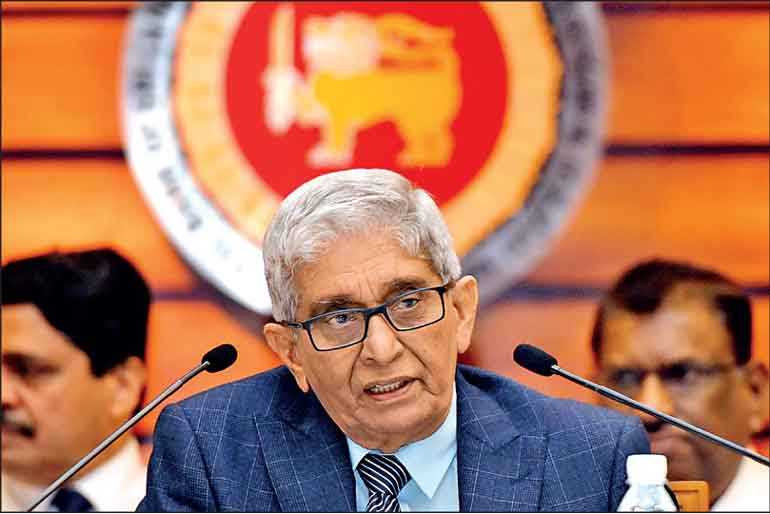Friday Feb 27, 2026
Friday Feb 27, 2026
Saturday, 27 June 2020 00:10 - - {{hitsCtrl.values.hits}}
 Central Bank Governor Prof. W. D. Lakshman
Central Bank Governor Prof. W. D. Lakshman
The Central Bank (CBSL) yesterday took a fresh move to set the record straight on the regulation of finance and leasing companies in an apparent response to the recent criticism by President Gotabaya Rajapaksa.
The bank issued a detailed statement clarifying its regulation and the extent to which the monetary authority can be held responsible whilst insisting existing laws and regulations cast responsibilities on the respective licensed/registered and regulated non-bank financial institutions (NBFIs) and the Board of Directors as well as the general public.
In the statement, the CBSL said that there was an attempt to paint the monetary authority as responsible for the failure and licence cancellation of several finance companies under the Finance Business Act No. 42 of 2011 (FBA).
The CBSL carries out the regulation and supervision of licensed finance companies (LFCs) to ensure and strengthen the stability of the LFCs and in turn, the stability of the financial system, which is one of the core objectives of the CBSL. Such stability is ensured through minimum capital, minimum liquidity, and provisioning requirements; regulation of investments to reduce concentration risk and corporate governance requirements.
“The LFCs are managed by boards of directors and key management personnel, which take independent business decisions and take full responsibility of managing the business. Such business decisions may lead to failure of such LFCs, despite continuous regulation and supervision carried out by CBSL. Cancellation of licence of an LFC is the final step of number of supervisory measures, and is done only when it is established that continuation of the business of such LFC would be detrimental to interest of its depositors and other creditors.”
The Central Bank emphasised the cancellation of a licence is a legitimate procedure performed under the provisions of the FBA. As per the provisions of the FBA, an LFC is obliged to take all reasonably necessary measures to repay deposits to its depositors.
“The CBSL does not ensure that an LFC under its regulation and supervision does not fail but would take all possible efforts to prevent such failure. It is categorically stated that no banking regulator extends such assurance, which is evidenced by failures of many reputed international banking institutions during the last several decades. In this light, it is reiterated that CBSL does not guarantee the return of deposits of a regulated financial institution, and repayment of such deposits from CBSL funds.”
In 2010, CBSL established the Sri Lanka Deposit Insurance and Liquidity Support Scheme (the scheme), which currently pays a maximum of Rs. 600,000 per depositor for each financial institution of which licence is cancelled or suspended.
The depositors of Central Investment and Finance PLC, The Standard Credit Finance Ltd., The Finance PLC and TKS Finance Ltd., (said LFCs), of which licenses were cancelled recently are being repaid out of the scheme, subject to the said maximum of Rs. 600,000, per depositor. Therefore, no CBSL or Government funds are used for deposit insurance payments to depositors of the said LFCs. Upon liquidation of the said LFCs the depositors may be entitled to further payments through proceeds received from disposal of assets.
The public was called on to be vigilant when depositing their money as to the soundness of the relevant LFC and CBSL would continue to improve the quality of information provided to customers to make this decision.
The attention of CBSL has also been drawn to the recent incident where a person has been allegedly assaulted and murdered by employees of an unauthorised financial institution, purported to be providing finance leasing facilities, the statement said.
Registration under the Finance Leasing Act, No. 56 of 2000 (as amended) (the FLA) is mandatory to carry out finance leasing business, and any person carrying out finance leasing business without such registration commits an offence under the FLA. The said institution has not been registered by CBSL to carry out finance leasing business, and therefore any finance leasing business carried out by such institution constitutes an offence. Upon receipt of information, investigations into such unauthorised conduct would be carried out by CBSL.
“CBSL invites the public to be vigilant when obtaining finance leasing facilities, which required the relevant institution to be registered under the FLA, while such registration is not required to carry out hire purchase activities under the Consumer Credit Act, No. 29 of 1982. The public is advised to obtain finance leasing facilities only from registered leasing establishments (RLEs), registered by the CBSL under the FLA.”
A list of the RLEs is available on the CBSL website. Only RLEs are subject to regulation and supervision of CBSL, including the debt moratorium announced through circulars No. 4 and 5 of 2020 issued by CBSL. It is emphasised that the said moratorium does not apply to entities other than licensed banks, licensed finance companies, and other specialised leasing establishments registered under the FLA.
The public is also encouraged to inform the CBSL of any such unauthorised organisations providing such leasing facilities and adopting unethical practices.
CB wants Govt. to enact Microfinance and Credit Regulatory Authority Act
The Central Bank yesterday urged the Government to enact the Microfinance and Credit Regulatory Authority Act as a further step to strengthening the financial system stability in the country.
“The Central Bank highlights the requirement for enactment of a legal framework to regulate unregulated moneylending activities so that a better and more effective regulatory environment is crated for moneylending institutions in the future. Hence the need for the enactment of the proposed Microfinance and Credit Regulatory Authority Act, approved by the Monetary Board of the CBSL is vital,” the Central Bank said in its statement yesterday.